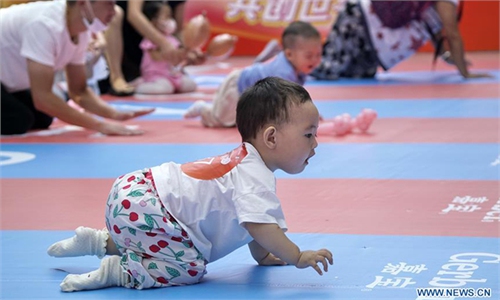Political advisor to propose removing restrictions on marital status for registration of newborns during two sessions

This photo taken on July 30, 2019 shows a child playing along the Songhua River in Harbin, northeast China's Heilongjiang Province. Photo: Xinhua
China could consider removing restrictions on marital status used for the registration of newborns, allowing unmarried women to enjoy services relating to fertility the same as married women, according to a proposal a Chinese political advisor plans to submit during this year's two sessions.
"All citizens are equal in front of law but only married women up to the policy of family planning could enjoy preferential policy like birth insurance, material leave and reimbursement for assisted reproductive technology expenses," said Xie Wenmin, a member of the 13th National Committee of the Chinese People's Political Consultative Conference (CPPCC), China's top political advisory body, who is also a director of Hubei Shouyi Law Firm.
While this population may be small in China but their needs cannot be neglected, Xie noted. Xie has prepared to make the proposal to move restrictions of marital status for birth registration at the two sessions.
In China, before women get access to birth-related services or enjoy preferential policies including birth insurance, they should register the births of their children and the number. Getting married is a premise for this registration.
Provinces including South China's Guangdong, Southwest China's Sichuan and Shanghai Municipality are among forerunners to have already called off such restriction.
The revision of the police will require a unified policy-making. "We need a countrywide law or regulation so as to allow every mom who would like to have babies enjoy equal rights," Xie noted.
Xie stressed the urgency to alter the policy, citing census data in 2020, which said the total fertility rate of women of childbearing age in China is 1.3.
The new policy remained controversial in provinces that have already made changes. Some believe it would bring certain convenience to single women who do not want to get married but do want children, but it may not necessarily stimulate them to have children. The main obstacle preventing young people from having children is the high cost of child rearing.
The move is not aimed at encouraging single people to have children before getting married, the Sichuan health authority told the media earlier, but to ensure that single people and their children can enjoy the same fertility services, even if they are not married.

